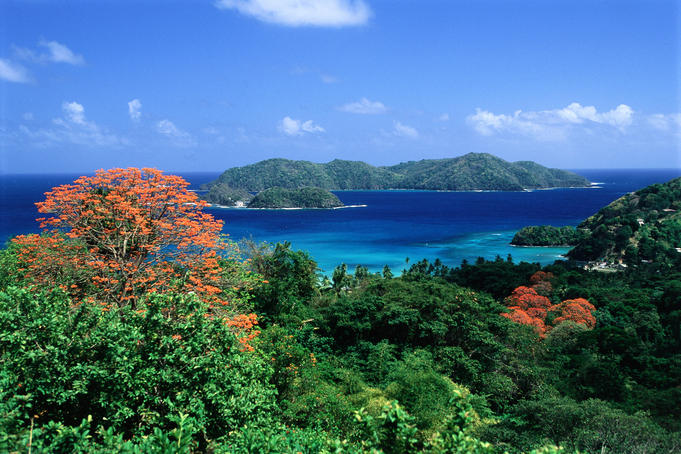
Tobago
"The Capital of Paradise"
Motto: "Pulchrior Evenit" (Latin)
"She becomes more beautiful"
Tobago here we come!
We are now preparing to move to Tobago. The church has been there five years and they have a small branch and four missionaries. We will serve as the Branch President and assist the two Elders and two Sisters that are laboring there. Elder and Sister Black from Arizona will trade places with us and they will work in the office for the balance of their mission.
 |
Elder and Sister Black said the walk from their house to the beach is a short distance and they love to walk in the white sands in their bare feet. The island is much smaller that Trinidad and they say the atmosphere is more laid back with a slower pace. The economy is tourism based, fueled by cruise ships or overnight visitors who fly or boat to the island.
The following history of Tobago was take from a tourist development guide:
"Earliest records show that Tobago - on which Columbus never landed - was stumbled upon by some Englishmen who promptly claimed it for their King. The island was inhabited by the Blicose Carib Indians who it is said first brought war to the West Indies. These original inhabitants, however, migrated to other islands to help their cousins in Dominica and St Vincent defend their homes against attacks by the Europeans.
The English, busy trying to colonize the island, had to contend with the Dutch who had founded a township near Scarborough called Lampsingberrg. The Dutch has a hard time fighting off attacks from the French and the English in battles that were found in the island's bays and hillsides. To this day the Island is dotted with Battlements and Cannons, silent witnesses to the struggles which took place throughout the seventeenth and eighteenth centuries.
The island was given to the Duke of Courland, the ruler of a small Baltic Principality, as a birthday present. The courlanders maintained a settlement in that part of Tabago which still carries the name Courtland.
Tobago changed hands dozens of times as one or other of the powers came and went. Finally the English were granted sovereignty by the Treaty of Paris in 1763.
The French returned twice to Tobago and occupied it from 1781-1793 and 1801-1802. During the latter period Tobago made history when they went to the polls and voted Napoleon Bonaparte First consul of the Republic for life. Tobago was joined with Trinidad as a British Crown Colony in 1889."
The waters around the island are home to many species of tropical fish, rays, sharks and turtles

The small neighboring islands support some of the best dry forests remaining in Tobago. Little Tobago and St. Giles Island are important seabird nesting colonies, with Red-billed Tropicbird, Magnificent Frigatebird and Audobon's Shearwater among others.
The Caribbean (West) side of the island is known for it's calm warm waters and the Atlantic side of the island has rougher waters ideal for surfing.
Small islands and coral reefs
 |
The Cocrico is the national bird of Tobago
Coral and tropical fish in the warm waters of the Caribbean
Pigeon Point, Tobago Photographs and much of the text taken from Tobago Island Bing and Wikepedia. |





No comments:
Post a Comment